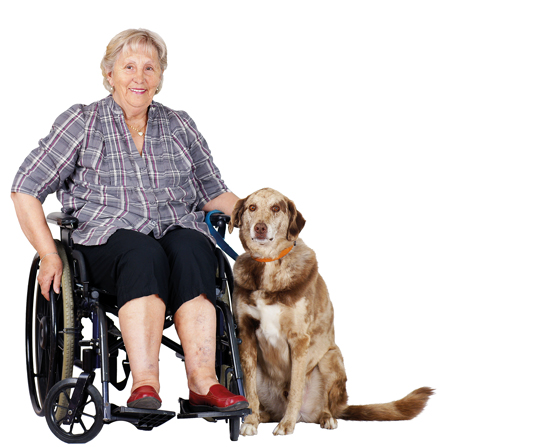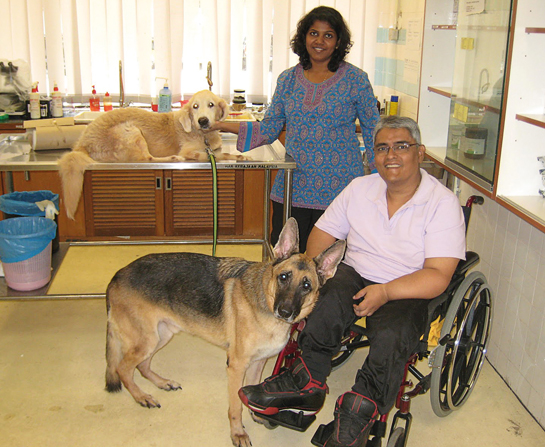According to founder Anthony Thanasayan, the Malaysian Animal-Assisted Therapy for the Disabled and Elderly Association (or Petpositive for short) is the first and only nationally registered non-profit society in the country which uses animals to empower the lives of disabled and elderly persons. While Anthony is a dog person, he assures that Petpositive works with all animals and offers a helping hand to all handicapped and elderly Malaysians.
“Pets can truly make a difference,” says Anthony, speaking from experience. Having a pet which does not see one’s disability as a weakness can help one develop a more positive outlook in life. Caring for a pet can also make one feel more empowered and confident. All these can help keep loneliness and depression at bay.
HOW PETPOSITIVE CAN MAKE A DIFFERENCE
Petpositive works closely with a network of animal shelters and veterinarians, and therefore, can provide assistance in finding a suitable companion for an elderly or disabled person. The organization may also under certain circumstances, consider absorbing or subsidizing certain costs for those in need.
“However, we do this on a case-by-case basis,” explains Anthony. “We also have to look out for the welfare of the pets. Hopeful future pet owners and their family members need to demonstrate that they can take good care of the pet. In the event that the pet needs medical attention, there should be at least one person who can help the owner send the pet to a vet.”
Another important point to consider is the expectations of the person seeking animal therapy. Some applicants are looking for service dogs, but they expect these dogs to be able to immediately perform advanced tasks such as leading the blind through the streets. Such expectations are unrealistic and possibly dangerous, as in reality, dogs need to be given rigorous training before they can serve as service dogs. It is important that applicants have realistic expectations for their dog and are committed to participate in the necessary training of the dog.
Of course, some applicants may not want to keep a pet full-time. For these people, Petpositive can help by bringing around a pet to keep the person company at certain time of the day. The organization has volunteers who would gladly share their well-trained pets with those who would love to spend some time with these pets.
This brings us to the next point – Petpositive also assists in training pets, usually dogs, to be capable assistants as well as companions to the elderly and the disabled.
SO, LOOKING FOR A PET?
Dogs.
Like their undomesticated wolven ancestors, dogs are pack animals. Once they accept you as a part of their pack, they will be loyal and helpful companions. Sturdier working breeds, such as the Rottweiler and German Shepherd, can be reliable assistants as well after proper training. If you are looking for a furry friend who will help you in matters such as fetching items out of your reach, you may consider a dog. All a dog wants in return is your love and affection.
Cats.
Cats are solitary creatures, so they are not ideal if you are looking for a companion which can lend a helping hand. On the bright side, they make lovely companions for the bedridden or people who live a more sedate lifestyle. A cat can curl herself up in one’s lap, and just running one’s fingers through the cat’s fur can be therapeutic for most people.
Fish and other aquarium pets.
From Anthony’s experience, such pets are great for the mentally disabled, as caring for them can be as simple as feeding these pets at the right time. He recalls the mother of a disabled daughter, who managed to bring some joy and laughter into her daughter’s life by having an aquarium at home.
WON’T THE PET BE AN EXTRA BURDEN?
Caregivers may understandably worry that giving their charge a pet may mean having an extra member of the family to care for.
This is a common misperception, according to Anthony. True, some degree of care may be required, but certain pets, especially dogs, can be trained to require the most minimal care and supervision from other people. Anthony’s dogs are an excellent testament to this. Here are just some examples of the dogs in action:
They are trained to do their “business” in the toilet, making it easier for Anthony to clean up when they are done.
Feeding is not an issue at all to Anthony, who is wheelchair-bound. It is easy, and in fact, feeding his dogs is a “special time” that he cherishes every day.
The older dogs help in keeping the younger pups in line. When an overexcited puppy runs out to play, for instance, an older dog would gently herd the puppy back. All this without any orders from Anthony!
While it may be unrealistic to assume that no care is needed from the caregiver, caring for a pet is usually less strenuous than imagined. Anthony suggests that families of the disabled or the elderly, who are considering a pet for the person, can get in touch with Petpositive to discuss the matter further.
INTERESTED IN ANIMAL THERAPY?
If you wish to learn more about animal therapy, you can always drop Anthony an email at [email protected] or [email protected]. Petpositive also welcome enquires from people interested in volunteering or offering donations/assistance.







